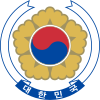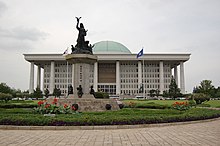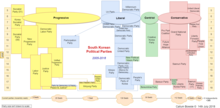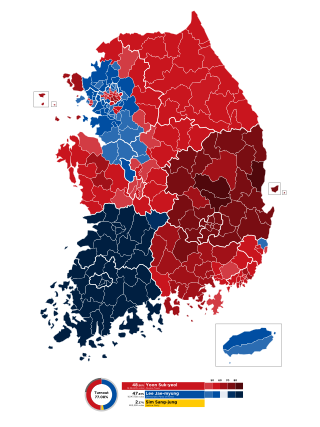This article needs additional citations for verification .(April 2014) |
Politics of the Republic of Korea | |
|---|---|
 | |
| Polity type | Unitary presidential constitutional republic |
| Constitution | Constitution of the Republic of Korea |
| Legislative branch | |
| Name | National Assembly |
| Type | Unicameral |
| Meeting place | National Assembly Building |
| Presiding officer | Kim Jin-pyo, Speaker of the National Assembly |
| Executive branch | |
| Head of State and Government | |
| Title | President |
| Currently | Yoon Suk Yeol |
| Appointer | Direct popular vote |
| Cabinet | |
| Name | State Council |
| Leader | President |
| Deputy leader | Prime Minister |
| Appointer | President |
| Headquarters | Yongsan, Seoul |
| Ministries | 18 |
| Judicial branch | |
| Name | Judiciary of South Korea |
| Supreme Court | |
| Chief judge | Cho Hee-dae |
| Constitutional Court | |
| Chief judge | Lee Jongseok |

 |
|---|
The politics of South Korea take place in the framework of a presidential representative democratic republic, whereby the president is the head of state, and of a multi-party system. To ensure a separation of powers, the Republic of Korea Government is made up of three branches: legislative, executive, and judicial. The government exercises executive power and legislative power is vested in both the government and the National Assembly. The judiciary is independent of the executive and the legislature and comprises a Supreme Court, appellate courts, and a Constitutional Court.
Contents
- National government
- Executive branch
- Legislative branch
- Judicial branch
- Political parties and elections
- Political nature
- Latest elections
- Presidential election
- By region
- Legislative election
- Political pressure groups and leaders
- Administrative divisions
- Foreign relations
- See also
- Notes
- References
- External links
Since 1948, the constitution has undergone five major revisions, each signifying a new republic. The current Sixth Republic began with the last major constitutional revision that took effect in 1988. From its founding until the June Democratic Struggle, the South Korean political system operated under a military authoritarian regime, with the freedom of assembly, association, expression, press and religion as well as civil society activism being tightly restricted. During that period, there were no freely elected national leaders, political opposition is suppressed, dissent was not permitted and civil rights were curtailed.
The Economist Intelligence Unit rated South Korea a " full democracy " in 2022. [1] According to the V-Dem Democracy indices South Korea was 2023 the third most electoral democratic country in Asia. [2] South Korea is often cited as a model of democracy due to its relatively peaceful and internally-driven democratic transition. [3] [4] [5] [6] [7]
However, the mid-2000s to mid-2010s are often considered South Korea's backsliding period. Although, some have argued South Korea has hit a democratic ceiling and changes are more characteristic of democratic stagnation in lieu of regression. This took the form of more state involvement (particularly through the Korea Communications Commission or KCC) in media control and less editorial independence among journalists with conservative media owners. [8] [9] Overall, political expression lagged behind comparable democracies. [10] [11] Additionally, South Korea has very strict election and campaign finance regulations, that includes no door-to-door canvassing and, consequently, some have cited these regulations as barriers to political expression and free and fair elections. [12] [13] These changes have largely attributed to South Korea's weak political party structure that emphasizes leaders and, consequently, hyper-presidentialism. Moreover, a right-left ideological divide has been more deeply entrenched into South Korean political society. [14] [15] [16] However, South Korea is considered to have a strong civil society or simin sahoe manifested through a large number of civic organization that prevented further backsliding via the 2016-2017 Candlelight Demonstrations. [17] [14]
Under more recent administrations such as President Yoon Suk Yeol, South Korea has taken a stance as a "Global Pivotal State," which involves a greater role in East Asia as a democratic power. Despite its own democratic struggles, South Korea has taken an active role on democracy on the global stage having hosted the 2024 Summit for Democracy and committing to "strengthen coordination on promoting democracy and protecting human rights" at the 2023 Camp David Summit with the U.S. and Japan, bolstering their trilateral relationship. [18]

















